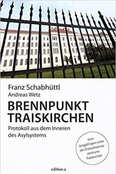Focus on Traiskirchen
Report from within the asylum system
Focus on Traiskirchen
Report from within the asylum system
Publisher edition a, 261 pages, ISBN 978-3-990001-217-8, €21.90
“There was a week in which we had to dispose of fifty tonnes of voluntary donations. The refugees didn't want any more clothes or food because they already had enough.” Franz Schabhüttl, 26 years in the Traiskirchen refugee camp and 13 years its director, does not submit a statement of accounts upon his retirement. Rather, he provides information on what really happens in the asylum system away from the media and the non-governmental organisations. The top official of the Ministry of the Interior paints a multi-faceted picture of state refugee work that the public has never seen before. An illuminating book about everyday life in the asylum system, politicians who misuse it as a tool for their own party politics, and the real downsides of migration.
Review:
After a predominantly icy silence about the so-called refugee crisis, informative books are now thankfully conquering the market. One of the most important new publications on the Austrian book market is undoubtedly the book presented by the now retired director of the Traiskirchen refugee camp. Like no other place, Traiskirchen stands as a synonym for escape, refugees and - as conveyed by the media - for misery and need; that this is far from reality is presented by Franz Schabhüttl and his co-author Andreas Wetz in an impressive and unemotional way.
In the foreword, the author stresses that for him “the problem is not asylum seekers who fall into crime, but full-time criminals who deliberately abuse asylum for their own purposes” (page 10 f.). He sees it as the task of the state to find out who is a legitimate asylum seeker as quickly as possible. It is precisely this failure on the part of the state, that the borders were left open despite the imminent flows of people, which is becoming increasingly unacceptable for the population.
Schabhüttl's statement that his work and actions were solely based on laws applicable in Austria (cf. page 10) seems to be honourable. Here, Schabhüttl is to be sympathised with because the onslaught from 2015, which he had to manage in the Traiskirchen camp, was based on a massive violation of the law by the government in keeping the borders open without any immigration control. Schabhüttl therefore had to manage this breach on the basis of laws that were applicable but de facto repealed. A madness that taxpayers and voters and their descendants will still have to deal with for many decades to come. It is to his credit not to have participated in this breach of law, but to have acted strictly in accordance with it, and there is nothing to blame him for in this respect; indeed, according to his descriptions, we should even be grateful for his steadfastness.
Schabhüttl had a hard time during his time as head of the so-called "Bundesbetreuungsstelle Traiskirchen", as the refugee camp is officially called in German. He found himself in a minefield of politicians, the media, NGOs with their own agenda and private individuals, who all thought they were doing good for the people in Traiskirchen. However, this often went wrong and resulted in high additional costs for taxpayers or enormous amounts of waste, which rose to 145 tonnes in September 2015 - the peak of the refugee crisis - due to false reports by NGOs pursuing their own agenda, such as Caritas or the Red Cross. This impressive number included 95% voluntary donations of food and clothing; Schabhüttl explains: “The refugees didn't want any more clothes or food because they already had enough.” (page 203). Many helpful citizens “donated used and bought new goods” (page 204), with the donated goods on site. The supposed undersupply of refugees exaggerated in the media was used by the NGOs to create a certain mood among the population, something that these NGOs in particular accuse others of, such as the FPÖ.
In his “Report from Within the Asylum System”, Schabhüttl does not cut corners with criticism of the various parties involved, such as mayors, interior ministers, “non-profit organisations” and NGOs, including, above all, Amnesty International and Caritas. Some of what he talks about had already made its way into the public domain, but the view of the head of the first reception centre was often lacking due to ministerial muzzles (cf. page 138). This book now makes the missing page accessible, describing for example that the work of the refugee commissioner installed by the government, former Raiffeisen Advocate General Christian Konrad, was represented completely differently in the media than evidently perceived on site in Traiskirchen.
Schabhüttl is also tough on the media. He “had everyone” (page 253), he gave hundreds of interviews, showed transparency, yet he often had a “light-bulb experience” when "his" interview, which he had never given, appeared in a newspaper. Journalists illegally entering the camp also pose a major problem for him, especially since their reports provided a distorted picture for the public; according to Schabhüttl for example, the refugees were not sitting “persevering and neglected” on the ground, as reported by the media, but were “waiting for lunch to be served” (page 258)
Conclusion:
A book that should be read by all interested parties, including those who are critical of Traiskirchen as an asylum centre or are often vilified as do-gooders. This book also clearly shows the ambiguous role of the media and NGOs. It is thanks to Franz Schabhüttl that the public now has the opportunity to form its own opinion outside the mainstream media, by courageously and honestly trying, together with his co-author, to present his view of what happened during his time in the Traiskirchen refugee camp.
FPÖ Education Institute rating:
Readability: ****
Comprehensibility: ****
Explosiveness/tension: ****
Argumentation benefit: ****
